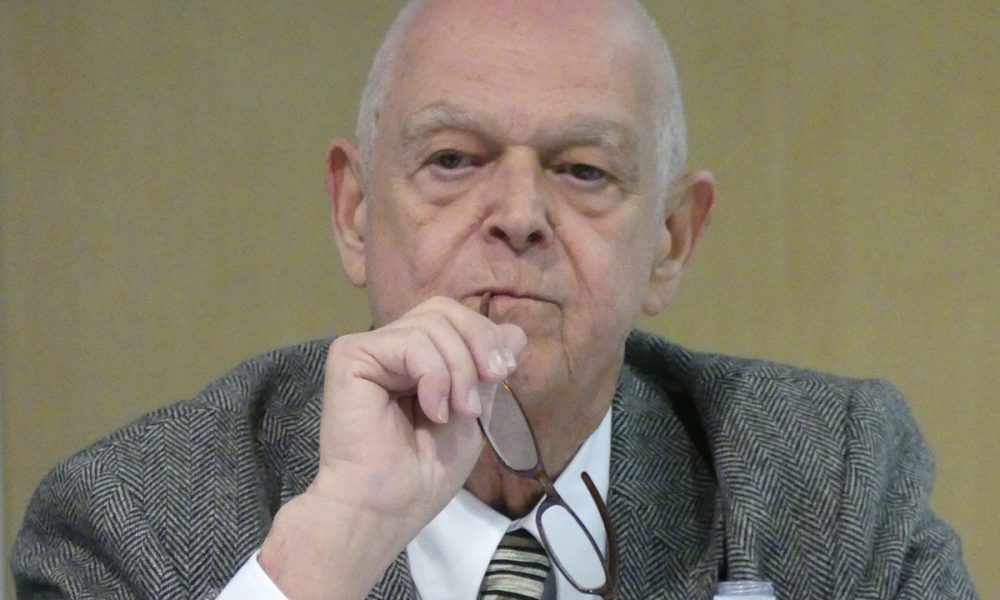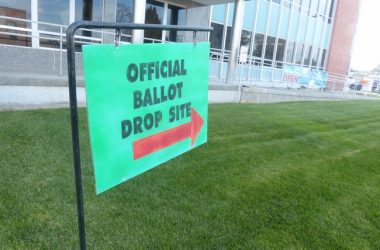
Ontario Mayor Ron Verini listens to a question during a Town Hall in March on Ontario’s proposed sales tax. (File photo/The Enterprise)
The solid defeat of Ontario’s sales tax leaves the question: Now what? Voters, property owners, business operators and government officials all should be clear that the vote settled a single issue – the tax. Left to be done is charting Ontario’s future in a way that inspires public confidence, strengthens the community, and heals the divides of recent weeks.
The sales tax started out in the hole. Oregonians just don’t like sales taxes. Tremendous salesmanship would have been needed to convince local voters otherwise. That didn’t happen. But there is more to the 2-to-1 defeat than antipathy towards a sales tax.
A close second in the list of reasons the tax went down was City Hall. We’ve addressed before what we think were the mistakes – imposing the tax without a vote or limitation, belatedly explaining where millions in fresh money would go, raising the city manager’s pay, and then the $200,000 error. None of it inspired confidence of the citizen. Instead, it made City Hall’s conduct the issue – not the future of the community.
Those missteps don’t change a truism. Ontario city government is underequipped to help the community thrive and grow. We supported the sales tax for that reason alone. A stronger city government is needed just as much now as before the tax vote. Police and fire services need support. Streets need work. And attacking the slovenly properties that mar the community must continue.
What next, then? Everyone has a job to do.
The Ontario City Council, for starters, has to confess its weak public standing and do something about that. Rebuilding public trust is essential before any new effort to fix city shortages can happen. Mayor Ron Verini must lead the councilors and city leaders in an honest diagnosis. No one at City Hall should shrug their shoulders about this.
Community leaders need to get off the bench. During the sales tax debates, respected leaders in business and civic organizations remained largely silent. They weren’t vocal about what they saw as Ontario’s needs. With exceptions, these leaders didn’t pipe up to use their accumulated integrity and respect to share their visions for the future of Ontario. They should do so now. They, too, can play a key role in mending a divided community.
Finally citizens have to get off the bench too. You had the sense during the campaign that many Ontario residents were paying closer attention to local government than they ever had. That’s good. We hope people within Ontario realize that City Hall is their institution – not the private instrument of public officials. Citizens should keep up their interest, learning more about what city government does, where it gets its money, and influence how that money is spent. Ontario is still small enough that a determined single citizen can make a difference. Look at Mary Jo Evers, whose work prompted a major change in the city budget.
One place to pull all these parties together is in the city’s effort underway to craft a strategy for Ontario’s future. Those working on it have done well to reach out to community groups and participants, but they should make it more clear than ever that this strategy is the people’s strategy, not a government-imposed version. Efforts should be doubled to draw more people to this community camp fire, for this conversation about where people want Ontario to go.
Verini, city councilors, and the citizens on the city Budget Committee should take an immediate step that shows the city is listening. They should repeal the extra $5 monthly surcharge they intend to assess to help make up for money not coming in from a sales tax. Letting the fee stand ignores the lessons of the tax vote. City officials could make no clearer declaration to the citizens about their intent to regain the trust of the people.
The fee was intended to cover the cost of two police officers. There is another source for that money – the $200,000 that became such an issue. The Budget Committee once spent it on retirement debt. Then it decided to spend it on street repairs. The Budget Committee should adjust again, using that money to cover the costs of those two police officers. That ensures a vital government service, leaves time for solving street and other issues, and tells the community in no uncertain terms: We get it. – LZ




